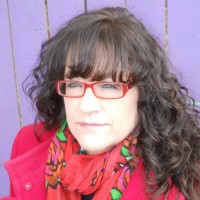+ + +
I can no longer see a way out. A way out that would allow me to keep the baby and my identity. So I stay home while he takes the car in for work every morning. I assume he goes to work every morning. He’s out of the apartment by 7a.m. and back by 5p.m. ready to eat.
Before the baby came, I thought getting pregnant would bind him to me, he wouldn’t leave as often, would spend the night more often. I thought, a man likes to have a child and a woman to come home to. I thought he’d be a man like that. One I could recognize and predict.
Now the baby takes up all my time. He allows me to stay home and take care of her but I long to sit at a desk again, have a new box of pencils, a calculator and a computer, pictures on a wall, go to lunch, come home tired and ready to eat.
He’s never said to me in so many words what he would do if I were to try and get a job or take the baby away. It’s more like something understood between us. If I want to have a home and a family with him, I must stay here and behave as he sees fit. He hasn’t said the exact words of what would happen. I don’t want him to.
For now, the baby is too small to understand what’s going on. But the day will come, I believe the day must come, when she and I will leave this place before she can understand what her mother has made of her life. I can look in the mirror now but soon, I will not be able to meet my daughter’s gaze. I will know when it comes. I hope we will be somewhere else long before that day comes.
+ + +
When I was still single and working in the back of the bookstore, adding up receipts, counting money, I didn’t talk to many people. I liked it better that way. I would imagine what the people were like by the names and book titles on the receipts.
Susan Miller: five romances, one western, one self-help.
Tom McNight: one non-fiction on World War II and a coffee mug.
Nancy Billingsly: Two cookbooks, a science fiction paperback and a calendar.
I never met these people but I felt that I knew them pretty well. None of them bought the books I would have bought. I wondered how Susan Miller could be interested in romances and westerns or if Tom McNight sipped coffee while he read about World War II.
Nina Samsara: one coffee table art book, one history book on the Mayan empire, three self-actualization books, one OED, one used set of Encyclopedia Britannica and the latest issue of Home Beautiful.
I loved to look at Home Beautiful, sometimes Architectural Digest. I’d bring them up to the office with me to read on my lunch break. I knew I would never live in houses like those but just seeing them fed my imagination. It was all I really needed.
+ + +
Before I worked at the bookstore, when I still lived at home, it was hard to date much. Mother said I had to follow the rules of the house and just because my father was no longer there didn’t mean I could stop following the rules. She would say “What would your father think of that?” a lot to me during the two years after my father died and I finally moved out.
I was only nineteen when he died and I had no answer for her. I had no idea what my father would have thought but I imagined whatever it was, it wouldn’t be good. I had the idea that my father must have been much more strict than my mother even though I don’t remember him that way.
+ + +
When I was seven years old my mother was late picking me up from my weekly piano lesson so I decided to walk home. I’d watched my mother drive me to my piano lessons for two years and felt I knew the way by heart. The fact we lived two towns distant did not dissuade me.
I had my sheet music under my arm. It was a cool autumn afternoon. The sun would soon go down. The streets were full of shadows and golden light, there was a good breeze running through my hair that made the journey comfortable and exhilarating.
In those days, the expressway had not yet been built and the train tracks still ran along the main road we drove every week. I conjured the idea to get to those tracks and follow them along so as to stay off the road and avoid being killed by a car. I must have been fairly certain the trains were no longer running though I did walk just to the side of the tracks and not directly on them.
I hadn’t gotten very far when I heard a car horn and my mother’s voice. I got into the car sure she’d be pleased I’d taken so much initiative. When we got home she laid me down on the floor and spanked me through my pee-stained cotton underwear, my cries muffled by the musty taste of the carpet fibers on my tongue long after she left my room.


